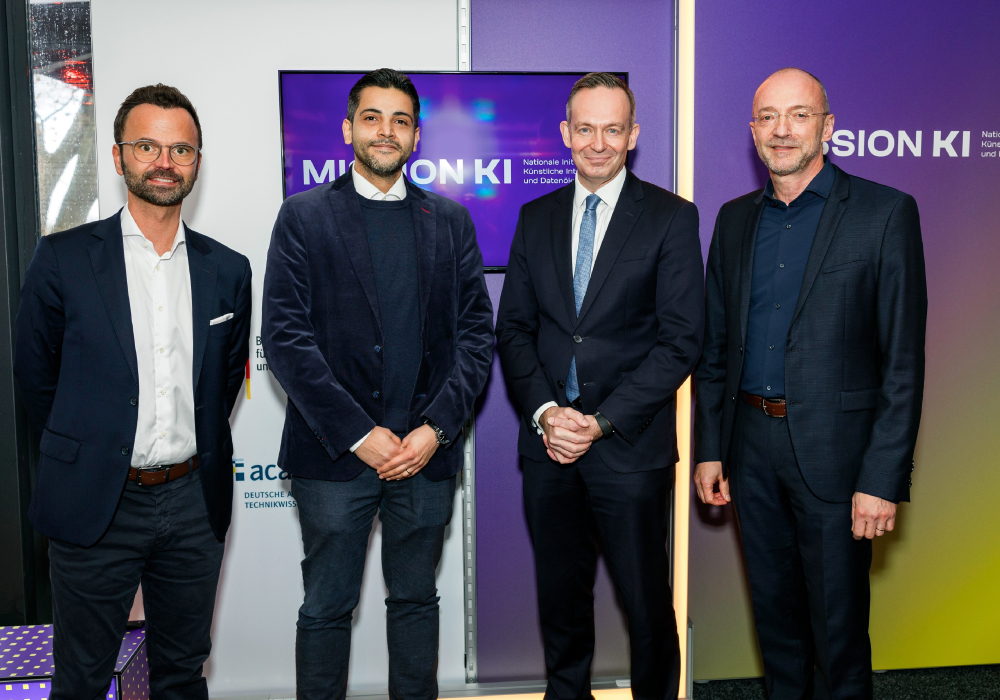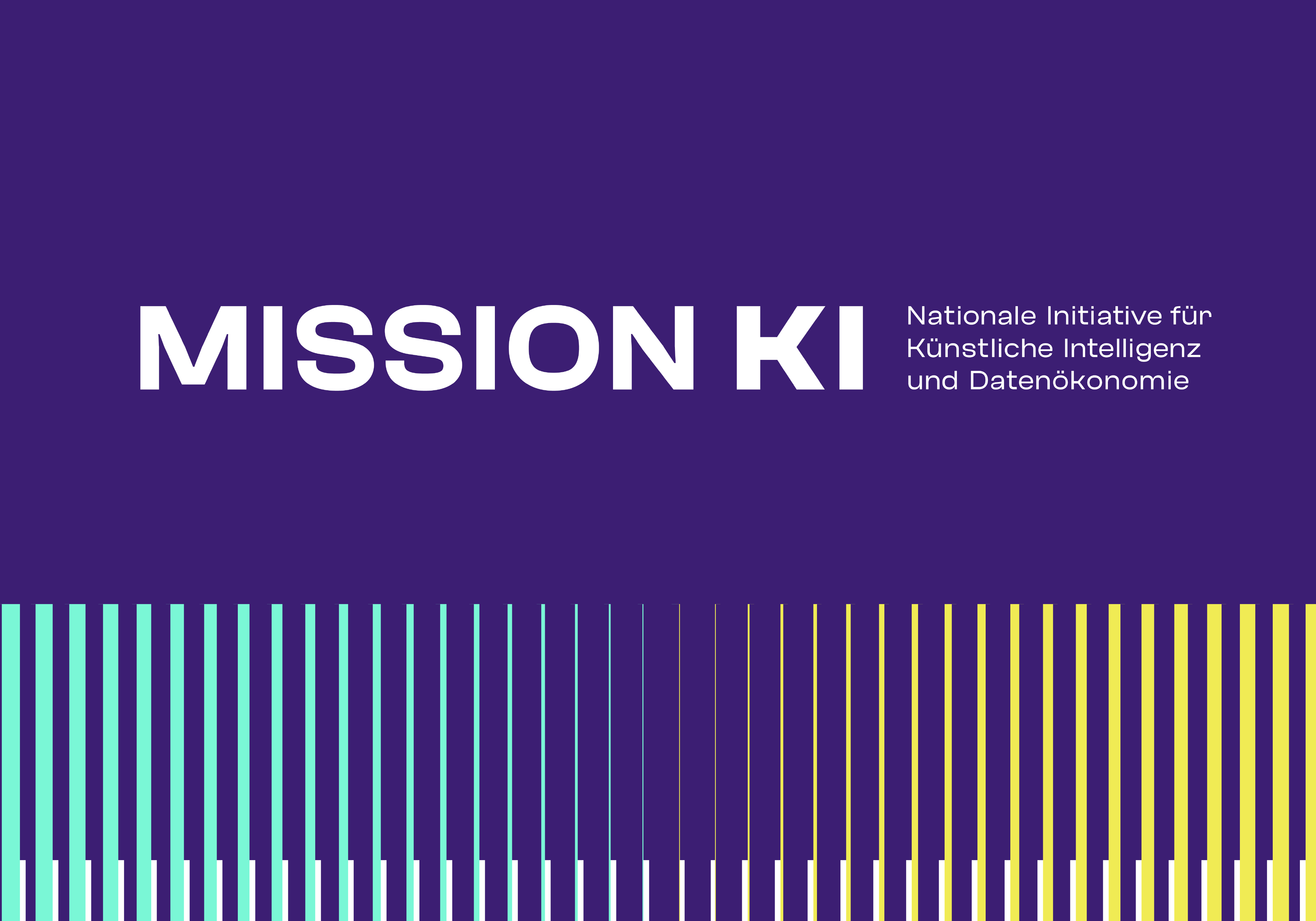MISSION KI – National Initiative develops AI testing approaches and two AI centres

Mainz, 24 November 2023
Strengths in the research of AI – and then what? With the National Initiative for Artificial Intelligence and Data Economy, the Federal Government aims to support the growth of trustworthy , marketable AI applications in Germany. Today, the initiative announced the foundation of a consortium that wants to develop uniform AI quality standards as a basis for a voluntary German AI quality label. Likewise, the decision was taken for the creation of AI centres in Berlin and Kaiserslautern. A “Hebelprojekt” (lever project), the Nationale Initiative is entitled in short: MISSION KI.

MISSION KI aims to increase the speed at which Germany is developing “AI made in Germany”. Germany stands for quality, a strong industry and outstanding AI research – and wants to become a leader in the realisation of quality-assured AI applications. The initiative will be developed by acatech – National Academy of Science and Engineering and receives its 32-million-euro funding from the German Government.
Federal Minister for Digital and Transport, Dr. Wissing, states, “I want to strengthen the development of artificial intelligence in Germany. And for this, we need a reasonable regulation of AI in Europe. One that is open to innovation instead of technology bans, and with standards that can be integrated on an international level. At the same time, we must also create better conditions for digital innovations in our country. The project MISSION KI aims at supporting the development of high-quality AI products. ‘AI made in Germany’ can become a global competitive advantage if we make it easier for our domestic AI companies to bring to market high-quality, secure and high-performing AI applications.”
Quality label brings AI out of the black box
Today, many people view AI as a black box: it often remains unclear what exactly AI solutions do with data and, above all, how they arrive at their findings and decisions. MISSION KI sets out to develop and test AI quality and testing standards and, based on these, define a voluntary AI quality label. To achieve this, the initiative bundles the competencies of renowned standardisation and testing organisations. Participants of the partnership are:
- AI Quality & Testing Hub
- CertifAI
- Fraunhofer Institute for Intelligent Analysis and Information Systems IAIS
- PwC Germany
- TÜV AI Lab (German Inspection Association AI Lab)
- Verband der Elektrotechnik Elektronik und Informationstechnik e.V. (Association for Electrical, Electronic & Information Technologies)
“Quality and testing standards are important cornerstones for AI-based products and services. We have the chance to redefine the ‘made in Germany’ seal of quality. On a global competitive level, we are therefore continuing to write our story of success based on excellent products and services. Voluntary standards also create added value for fair and comparable conditions of competition,” said Hendrik Reese, Partner for Responsible AI and Project Lead at PwC Germany.
The AI quality label forms the foundation of trust, which has been lacking to date, that private as well as industrial users of AI applications can rely on and that can give them peace of mind. This strengthens the marketability of AI applications and therefore the ability of German companies to be competitive.
AI centres for Kaiserslautern and Berlin
MISSION KI is building up AI quality and innovation centres which serve as a testing environment for experiencing trustworthy AI. The first centres are in Berlin and Kaiserslautern. The AI centre in Berlin addresses all those who want to learn more about AI and test the applications. It shall create a space for coming together and starting a dialogue on how AI should be used and which limits it should be subject to.
In Kaiserslautern, MISSION KI aims to create a meeting point for entrepreneurs, start-ups, SMEs and major companies who want to transfer AI from the research room to use in real life. The AI centre in Kaiserslautern gives them access to top-class research and AI testing environments – thanks to a cooperation with the German Research Center for Artificial Intelligence (DFKI), which is headquartered there. The aim is to set up an AI showroom and testing environment in Kaiserslautern that make AI accessible to the public and trials AI testing approaches in real cases of application, to develop these further and establish an AI quality label.
“Our goal is to visualise top-quality research and make it tangible, to show the diverse range of potential use of artificial intelligence, and to lead a participatory discussion with all areas of society in order to create a broad basis of trust for this important key technology,” said Prof. Dr. Andreas Dengel, Managing Director of DFKI in Kaiserslautern. “At the same time, we look forward to contributing our expertise and experience to develop systematic methods for quality assurance regarding AI applications – together with the partners of MISSION KI – and to make the rapidly growing AI ecosystem usable in real life,” added Prof. Dengel.
The Minister for Economic Affairs for the State of Rhineland-Palatinate, Daniela Schmitt, welcomes the selection of Rhineland-Palatinate. “The government’s decision to establish one of two outstanding AI centres in Kaiserslautern confirms the attractiveness of Rhineland-Palatinate as a place of innovation. As a state, with the newly established Innovationsagentur Rheinland-Pfalz (innovation agency Rhineland-Palatinate) and our technology centres, we are delighted to contribute to further empowering the trend of innovative, high-tech start-ups together with the Federal Government. Particularly for our start-ups, the entrepreneurs, is easy access to research and science fundamental. The government’s new AI centre in Kaiserslautern will be an important partner in this respect, also for the Innovationsagentur Rheinland-Pfalz.”
“We need innovations and new technologies to face the challenges of our time. Within the context of medicine and health, of better energy efficiency, of resource management, and of sustainable and efficient manufacturing, and to face the increasing shortage of labour by allowing routine work to be taken over or to aid decision-making, AI will play an ever more important role in future,” added Schmitt.
This is MISSION KI
MISSION KI – National Initiative for Artificial Intelligence and Data Economy is a joint project between acatech – National Academy of Science and Engineering and the German Federal Ministry for Digital and Transport (BMDV). The “Hebelprojekt” within the Digital Strategy of the German Government aims to strengthen digital competitiveness. The initiative followings three aims: MISSION KI shall expand the database for AI innovations by networking the data space across sectors and countries. MISSION KI shall create transparent AI quality and testing standards and, building on this, define a voluntary AI quality label according to German and European values. For this, MISSION KI is establishing AI quality and innovation centres; in other words, environments for testing and experimenting with as well as public spaces for experiencing AI. MISSION AI shall support the growth of AI innovations, by bringing together MISSION KI investors with AI start-ups and companies and developing non-financial measures which make it easier for researchers to spin-off.
Further information






